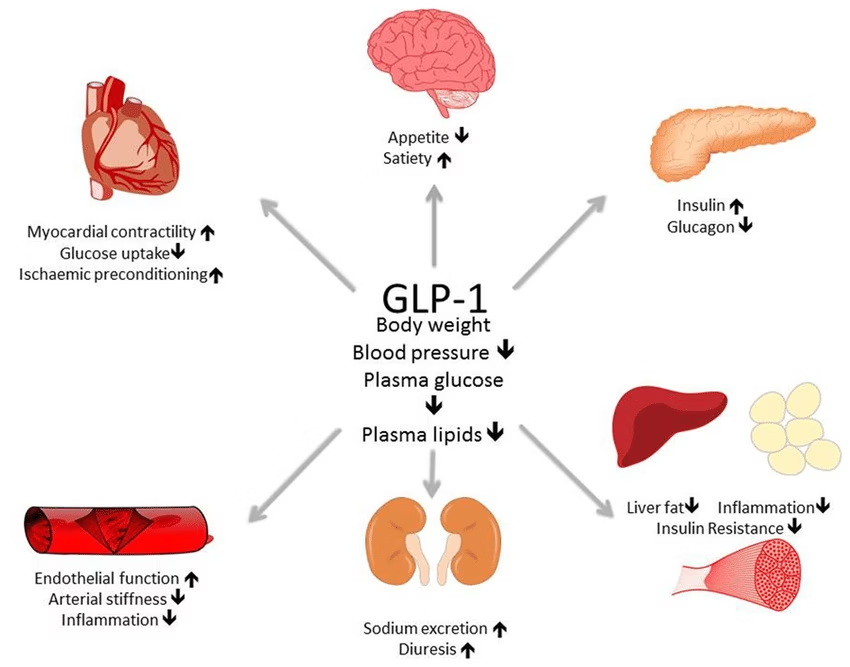Introduction
In recent years, weight loss management has seen a paradigm shift with the introduction of GLP-1 agonists—a class of medications originally developed for treating type 2 diabetes. These drugs have quickly garnered attention due to their significant impact on weight reduction and improvement in metabolic health. Backed by robust clinical data, GLP-1 agonists like semaglutide and liraglutide are emerging as a promising pharmacological approach in the fight against obesity. This article delves into the science behind these agents, reviews their clinical impact, discusses potential challenges, and explores future directions in research.
Understanding GLP-1 Agonists
GLP-1 (glucagon-like peptide-1) is a naturally occurring hormone that plays a key role in regulating blood sugar levels and satiety. GLP-1 agonists work by mimicking this hormone, binding to its receptor in both the pancreas and the brain. The result is enhanced insulin secretion in a glucose-dependent manner and reduced glucagon release, which collectively improve glycemic control. In the brain, these drugs promote a sense of fullness that leads to decreased appetite and lower overall calorie intake.
Mechanism of Action and Scientific Evidence
The therapeutic promise of GLP-1 agonists lies in their dual action:
- Central Nervous System Effects: Activation of GLP-1 receptors in the brain enhances satiety signals, leading to reduced food intake.
- Pancreatic Effects: By stimulating insulin secretion when glucose levels are high and suppressing glucagon, these drugs improve postprandial blood sugar control.
A landmark study published in The New England Journal of Medicine by Wilding et al. (2021) demonstrated that once-weekly semaglutide resulted in an average weight loss of approximately 15% in obese individuals. The STEP (Semaglutide Treatment Effect in People with Obesity) trials provided further substantiation, indicating that GLP-1 agonists not only facilitate significant weight reduction but also improve markers of metabolic health.
Clinical Impact on Weight Loss and Metabolic Health
Clinical trials have shown that GLP-1 agonists offer multiple benefits beyond weight loss:
- Significant Weight Reduction: Participants in clinical studies have experienced weight loss ranging from 15-20% of their body weight, a remarkable improvement compared to traditional lifestyle interventions.
- Improved Metabolic Parameters: Users commonly report better glycemic control, reduced blood pressure, and improved cholesterol profiles, all of which contribute to a lower risk of developing obesity-related conditions such as heart disease and type 2 diabetes.
- Quality of Life: Many patients notice an overall improvement in energy levels and quality of life as they lose weight and experience fewer obesity-related health complications.

Challenges and Considerations
Despite their promising benefits, GLP-1 agonists present certain challenges:
- Side Effects: The most common side effects include nausea, vomiting, and gastrointestinal discomfort. These symptoms are typically more pronounced during the initial stages of therapy.
- Cost and Accessibility: GLP-1 agonist treatments often require a prescription and can be expensive, limiting accessibility for some patients.
- Long-Term Safety: While short- and medium-term studies are encouraging, long-term data is still emerging. Continuous monitoring and additional research are needed to fully understand the long-term implications of these treatments.
- Personalized Medicine: Since responses to treatment can vary, it’s crucial that the use of GLP-1 agonists is tailored to individual patient profiles. Consulting healthcare professionals is essential to weigh the benefits against any potential risks based on personal health history.
Future Directions in GLP-1 Agonist Research
The evolving landscape of obesity management continues to drive research into GLP-1 agonists:
- Combination Therapies: New studies are examining the efficacy of combining GLP-1 agonists with other pharmacologic agents to maximize weight loss outcomes.
- Long-Term Studies: Extended trials are underway to better understand the chronic effects of these medications and to evaluate their potential in reducing obesity-related morbidity and mortality.
- Personalized Treatment Approaches: Advances in genetic profiling and personalized medicine may soon enable healthcare providers to customize treatment plans more effectively, optimizing outcomes for each patient.
- Expanded Indications: Ongoing research is exploring the potential of GLP-1 agonists in treating obesity-related comorbidities, such as non-alcoholic fatty liver disease (NAFLD) and cardiovascular disorders.
Conclusion
The integration of GLP-1 agonists into weight loss therapy represents a groundbreaking advancement in obesity management. Supported by compelling clinical evidence, these medications offer substantial weight loss and improved metabolic outcomes. However, as with any medical treatment, their use should be carefully monitored by healthcare professionals, considering both the benefits and the challenges associated with therapy. As research continues to evolve, GLP-1 agonists are poised to become a cornerstone in the long-term management of obesity, paving the way for more personalized and effective treatment strategies.
If you’re considering GLP-1 agonists for weight loss, consult your healthcare provider to discuss whether this treatment is right for you. We encourage you to share this article with friends and family who might benefit from these insights, and feel free to leave your comments or questions below. Stay informed and take the first step towards a healthier you!
Scientific References
- Wilding, J. P. H., Batterham, R. L., Calanna, S., Davies, M., Van Gaal, L. F., Lingvay, I., … & Kushner, R. F. (2021). Once-Weekly Semaglutide in Adults with Overweight or Obesity. The New England Journal of Medicine, 384(11), 989–1002. DOI: 10.1056/NEJMoa2032183
- Holst, J. J. (2007). The physiology of glucagon-like peptide 1. Physiological Reviews, 87(4), 1409–1439. DOI: 10.1152/physrev.00034.2006
- Additional clinical insights on GLP-1 agonist therapy can be found in reviews and meta-analyses available through PubMed and other scientific databases.
